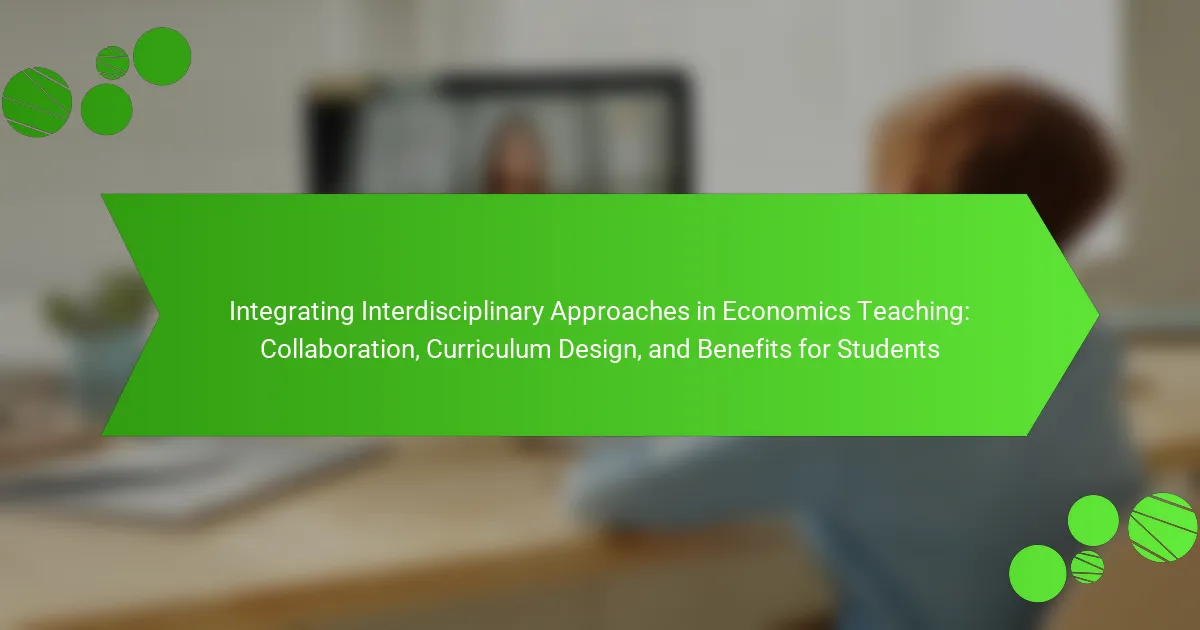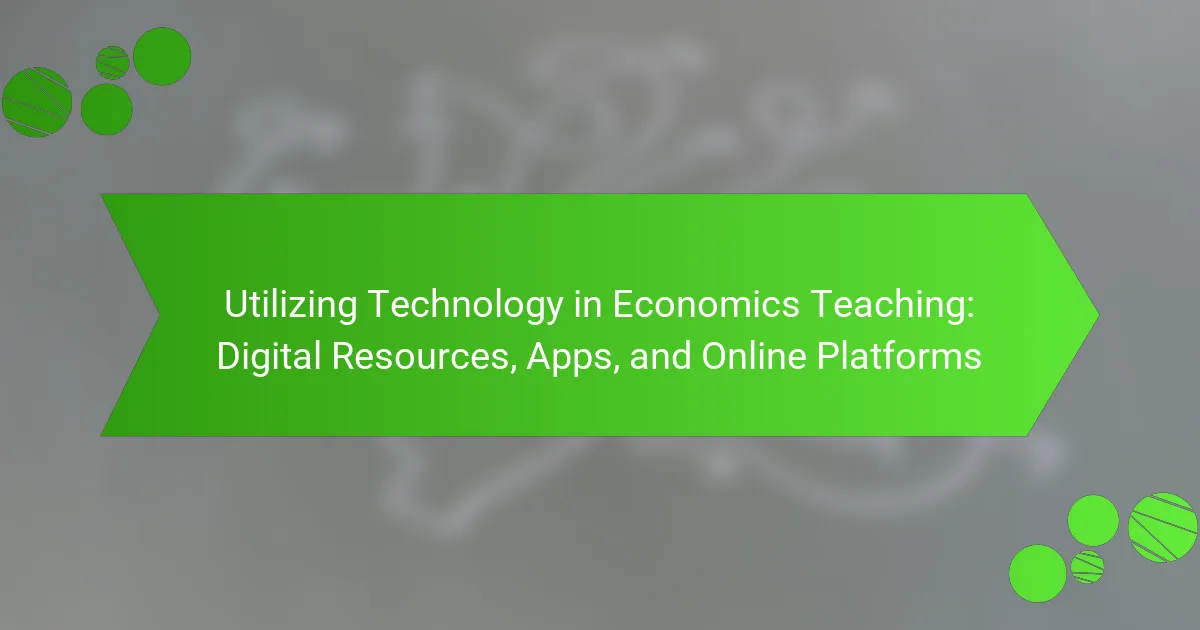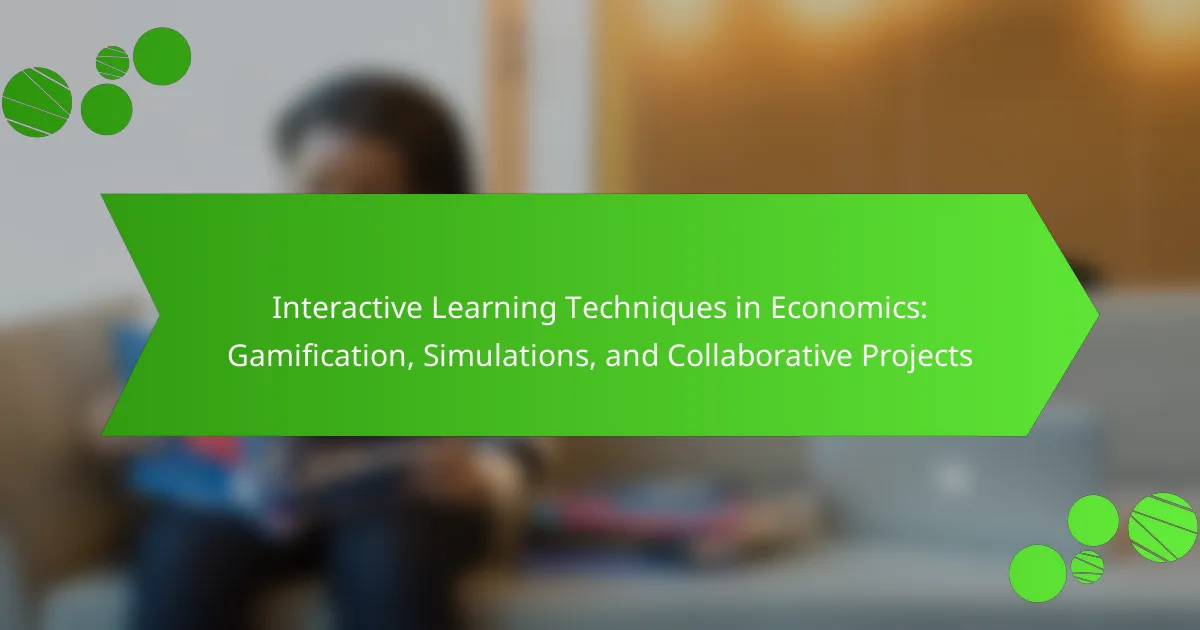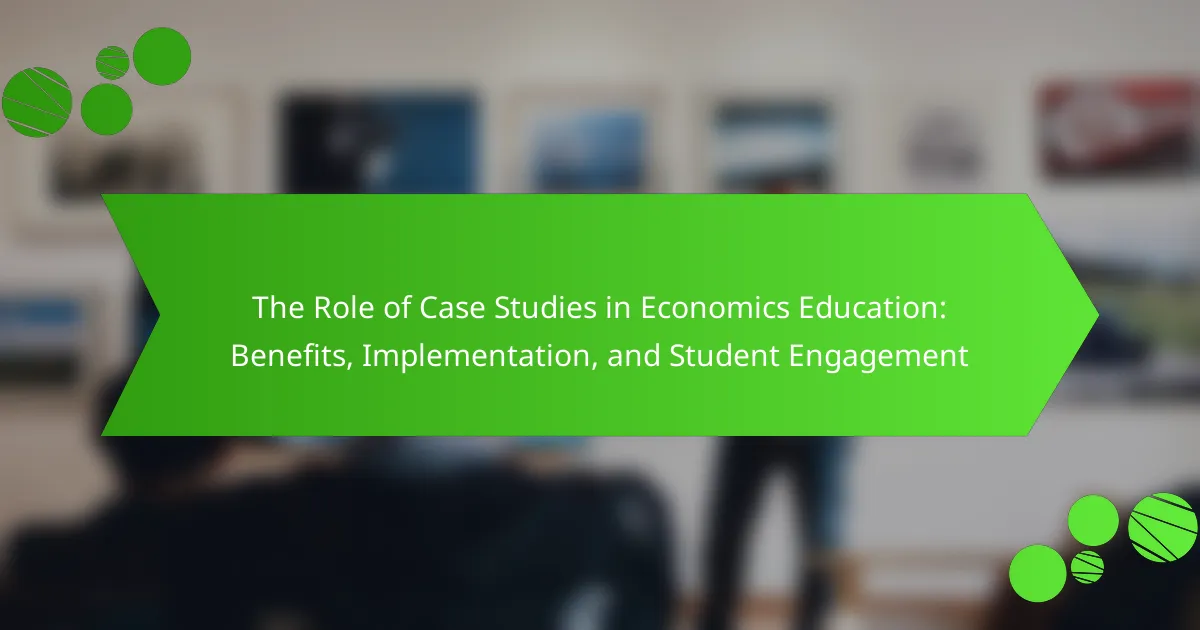Experiential learning is a teaching approach that significantly enhances economics education by applying theoretical concepts to real-world situations. This method not only improves students’ understanding and retention of economic principles but also fosters critical thinking, problem-solving, and teamwork skills. Research shows that students engaged in experiential learning report higher levels of engagement and motivation, as well as a greater appreciation for the relevance of their studies. Educators can further enhance this learning experience by integrating real-world projects, simulations, and collaborations with local businesses into the economics curriculum. Overall, experiential learning transforms the educational landscape by bridging the gap between theory and practice in economics.
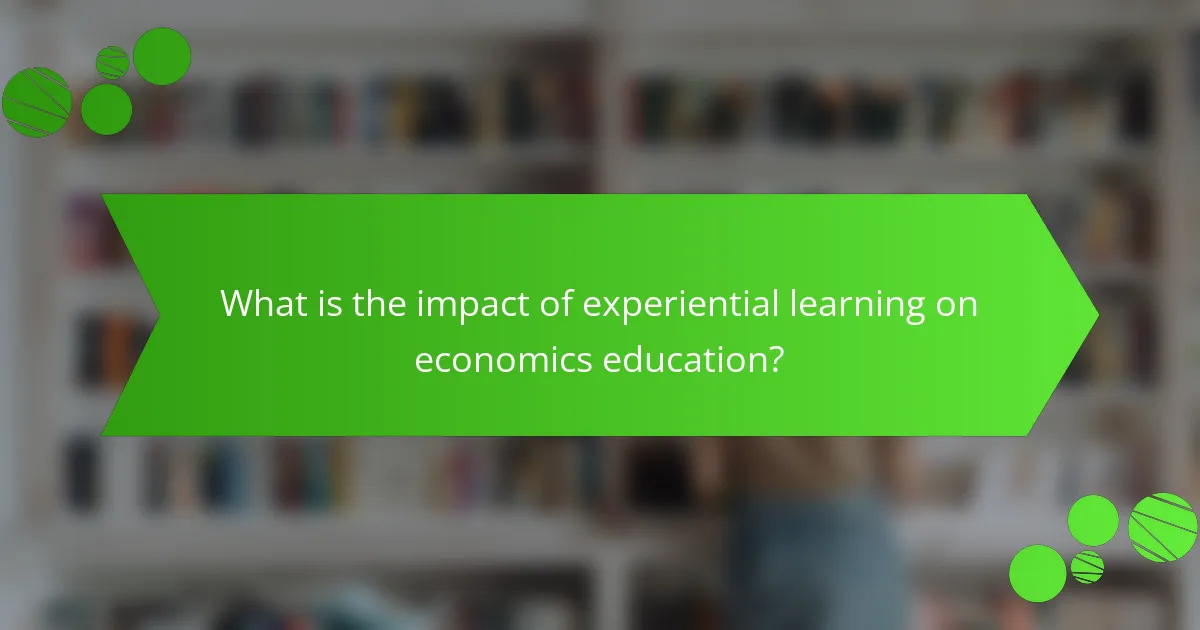
What is the impact of experiential learning on economics education?
Experiential learning significantly enhances economics education by providing practical, real-world applications of theoretical concepts. This approach fosters deeper understanding and retention of economic principles among students. Research indicates that students engaged in experiential learning demonstrate improved critical thinking skills. For instance, a study by Kolb (1984) emphasizes that experiential learning leads to better problem-solving abilities. Additionally, experiential learning encourages collaboration, as students often work in teams to solve economic issues. This teamwork enhances communication skills, which are vital in the field of economics. Furthermore, students report higher levels of engagement and motivation when participating in hands-on activities. Overall, experiential learning transforms economics education by bridging the gap between theory and practice.
How does experiential learning differ from traditional teaching methods in economics?
Experiential learning differs from traditional teaching methods in economics by emphasizing active participation over passive learning. In experiential learning, students engage in real-world activities, such as simulations and projects. Traditional methods often rely on lectures and textbook readings. This active approach fosters deeper understanding and retention of economic concepts. Research shows that students in experiential settings perform better in applying knowledge. A study by Kolb (1984) highlights that experiential learning enhances critical thinking skills. This method also encourages collaboration and communication among students. Overall, experiential learning creates a more dynamic educational experience in economics.
What are the key characteristics of experiential learning in the context of economics?
Experiential learning in economics emphasizes active participation and real-world application. It involves hands-on experiences that allow students to engage directly with economic concepts. This approach fosters critical thinking and problem-solving skills. Students analyze real economic data and case studies. They also participate in simulations and role-playing exercises. Reflection on these experiences enhances understanding and retention of economic principles. Research shows that experiential learning increases student engagement and motivation in economics courses.
How does experiential learning foster critical thinking in economics students?
Experiential learning fosters critical thinking in economics students by engaging them in real-world problem-solving scenarios. This hands-on approach allows students to apply theoretical concepts to practical situations. They analyze data, evaluate outcomes, and make decisions based on evidence. Such active participation enhances their ability to think critically about economic issues. Research shows that students involved in experiential learning demonstrate improved analytical skills. A study by Kolb (1984) highlights that experiential learning promotes deeper understanding and retention of knowledge. Overall, experiential learning transforms students into proactive thinkers in economics.
What are the real-world applications of experiential learning in economics education?
Experiential learning in economics education has several real-world applications. It allows students to engage in hands-on projects, such as running simulated businesses. This method enhances understanding of economic principles through practical experience. Students can analyze market trends by participating in stock market simulations. They can also work on community-based projects that address local economic issues. Internships provide direct exposure to economic environments, fostering professional skills. Collaborative learning in teams helps students develop problem-solving abilities relevant to economic challenges. Case studies allow for in-depth analysis of real-world economic scenarios. These applications demonstrate the effectiveness of experiential learning in preparing students for careers in economics.
How do case studies enhance understanding of economic principles through experiential learning?
Case studies enhance understanding of economic principles through experiential learning by providing real-world contexts for theoretical concepts. They allow students to analyze actual economic scenarios, fostering critical thinking. This approach encourages students to apply economic theories to solve practical problems. Research indicates that experiential learning improves retention of economic concepts. A study by Kolb (1984) emphasizes the effectiveness of experiential learning in education. Case studies also promote collaborative learning, as students often work in groups to discuss and analyze cases. This teamwork further deepens their understanding of economic dynamics. By engaging with case studies, students develop analytical skills relevant to real-world economic challenges.
What role do internships and field experiences play in economics education?
Internships and field experiences are crucial in economics education. They provide students with practical applications of theoretical concepts. These experiences enhance understanding of economic principles in real-world contexts. Students gain valuable skills such as data analysis and problem-solving. Internships also facilitate networking opportunities with professionals in the field. Research shows that students who engage in internships report higher job placement rates. A study by the National Association of Colleges and Employers indicates that 60% of employers prefer candidates with internship experience. Field experiences help bridge the gap between classroom learning and practical application.
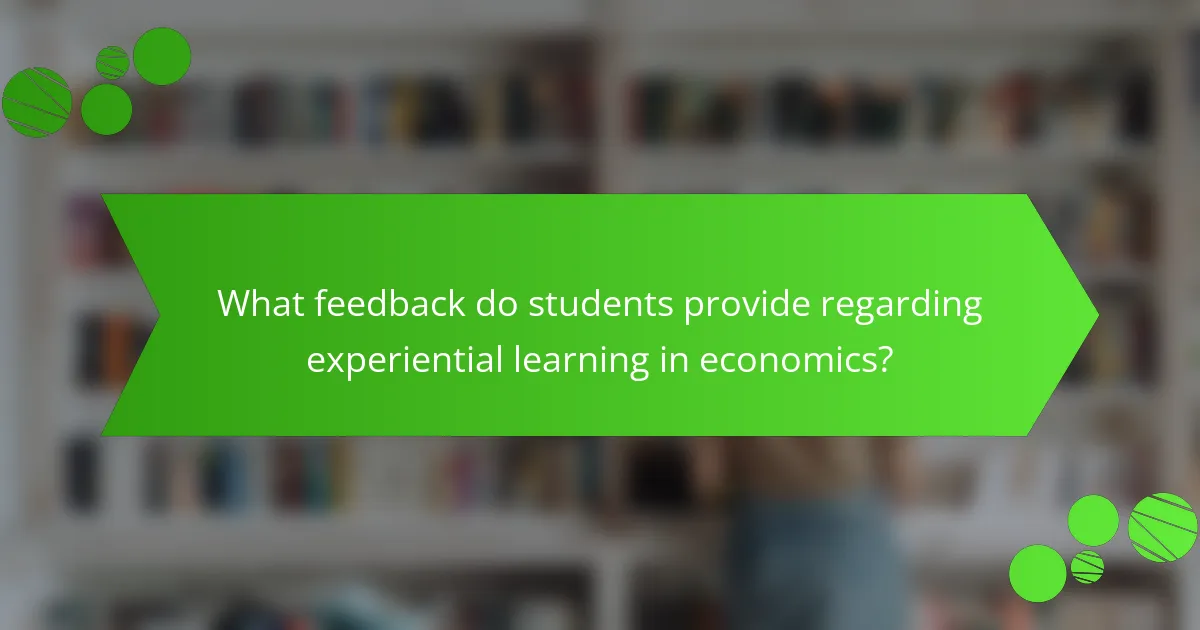
What feedback do students provide regarding experiential learning in economics?
Students generally provide positive feedback regarding experiential learning in economics. They often report increased engagement and motivation through practical applications. Many students appreciate the real-world relevance of projects and simulations. Feedback indicates that experiential learning enhances their understanding of complex economic concepts. Students often feel more prepared for future careers due to hands-on experiences. They cite improved critical thinking and problem-solving skills as key benefits. Additionally, collaborative projects foster teamwork and communication abilities. Overall, students believe experiential learning significantly enriches their educational experience in economics.
How do students perceive the effectiveness of experiential learning in their education?
Students generally perceive experiential learning as highly effective in their education. They report enhanced engagement and motivation through hands-on experiences. Many students believe that experiential learning helps them apply theoretical concepts in real-world contexts. Research indicates that 85% of students feel more prepared for their careers after participating in experiential learning activities. Additionally, students often express greater retention of knowledge when involved in practical applications. They appreciate the collaborative nature of experiential learning, which fosters teamwork skills. Overall, students view experiential learning as a valuable complement to traditional educational methods.
What specific skills do students feel they have gained through experiential learning?
Students feel they have gained critical thinking, problem-solving, and communication skills through experiential learning. Critical thinking allows students to analyze complex economic scenarios effectively. Problem-solving skills enable them to devise solutions in real-world contexts. Communication skills enhance their ability to articulate ideas clearly. Research indicates that 85% of students reported improved teamwork abilities as well. Additionally, 78% noted enhanced adaptability to changing situations. These skills are essential for success in economics and related fields.
How does student feedback vary across different experiential learning activities?
Student feedback varies significantly across different experiential learning activities. In internships, students often report increased confidence and practical skills. They appreciate the real-world application of theoretical concepts. In simulations, feedback indicates enhanced understanding of economic principles. Students enjoy the interactive nature and immediate feedback from peers. Service-learning activities receive positive comments for fostering community engagement. Students value the opportunity to apply knowledge in meaningful contexts. However, in group projects, feedback can be mixed. Some students express frustration with unequal participation. Overall, the type of experiential learning activity influences student perceptions and satisfaction.
What challenges do students face with experiential learning in economics?
Students face several challenges with experiential learning in economics. One significant challenge is the gap between theoretical knowledge and practical application. Students often struggle to connect classroom concepts to real-world scenarios. This disconnect can lead to confusion and frustration during experiential activities. Additionally, limited access to resources can hinder students’ ability to engage fully in experiential learning. For instance, some students may not have opportunities to participate in internships or projects due to geographical or financial constraints. Time management is another challenge; balancing experiential learning with coursework can be difficult. A study by Kolb (2014) emphasizes that these challenges can impact students’ overall learning experience and retention of economic principles.
What barriers to engagement do students report in experiential learning environments?
Students report several barriers to engagement in experiential learning environments. Common barriers include lack of time, inadequate resources, and insufficient support from instructors. Students often feel overwhelmed with balancing coursework and experiential activities. Limited access to necessary materials can hinder their participation. Additionally, students may perceive a lack of guidance or mentorship during these experiences. Concerns about the relevance of activities to their academic goals also contribute to disengagement. Research has shown that these barriers can significantly impact student motivation and learning outcomes in experiential settings.
How can educators address the challenges faced by students in experiential learning?
Educators can address challenges faced by students in experiential learning by implementing structured support systems. These systems include clear guidelines and objectives for experiential activities. Providing regular feedback is essential for student growth. Additionally, educators should facilitate reflection sessions to enhance learning outcomes. Incorporating diverse learning styles can cater to varied student needs. Training educators in experiential teaching methods can improve overall effectiveness. Research indicates that structured support increases student engagement and retention (Kolb, 1984). By actively addressing these challenges, educators can enhance the experiential learning process.
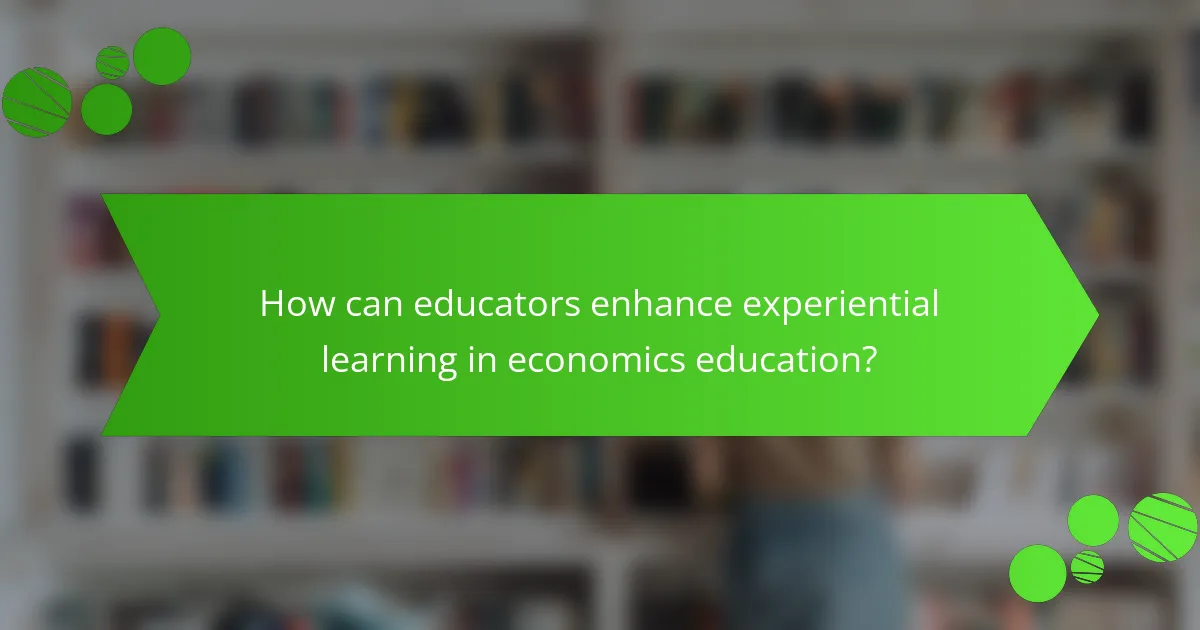
How can educators enhance experiential learning in economics education?
Educators can enhance experiential learning in economics education by integrating real-world projects into the curriculum. This approach allows students to apply theoretical concepts to practical situations. For instance, case studies can be used to analyze current economic events. Simulations of market dynamics can provide hands-on experience in decision-making processes. Collaborations with local businesses can give students insights into economic operations. Field trips to financial institutions can expose students to real-world economic environments. Additionally, incorporating technology, such as economic modeling software, can facilitate interactive learning. Research indicates that experiential learning improves student engagement and retention of economic concepts. According to a study by Kolb (1984), experiential learning significantly enhances understanding and application of knowledge.
What best practices can be implemented for effective experiential learning?
Effective experiential learning can be implemented through several best practices. First, integrating real-world projects enhances engagement. This approach allows students to apply theoretical knowledge in practical settings. Second, fostering collaboration among students promotes teamwork skills. Collaborative projects encourage diverse perspectives and problem-solving. Third, providing continuous feedback supports student growth. Regular assessments help learners understand their progress and areas for improvement. Fourth, encouraging reflection deepens learning. Reflection activities enable students to connect experiences with academic concepts. Lastly, aligning learning objectives with assessments ensures clarity. Clear expectations guide students toward desired outcomes. These practices are supported by research indicating that experiential learning significantly improves retention and understanding in educational settings.
How can collaboration with industry partners improve experiential learning opportunities?
Collaboration with industry partners enhances experiential learning opportunities by providing real-world context and resources. This partnership allows students to engage in practical projects that mirror industry challenges. Access to industry expertise enriches the learning experience through mentorship and guidance. Students gain insights into current trends and practices directly from professionals. Such collaborations often lead to internships, which offer hands-on experience in a workplace setting. According to a study by the National Association of Colleges and Employers, 60% of internships lead to job offers. This statistic underscores the value of practical experience facilitated by industry connections. Overall, collaboration bridges the gap between theoretical knowledge and practical application in economics education.
What resources are essential for supporting experiential learning in economics courses?
Essential resources for supporting experiential learning in economics courses include case studies, simulations, and real-world projects. Case studies provide practical examples for students to analyze economic concepts. Simulations allow students to engage in decision-making processes in a controlled environment. Real-world projects enable students to apply economic theories to actual situations. Additionally, access to financial databases and economic research tools enhances learning. Collaboration with local businesses can provide practical insights and experience. Guest speakers from the industry can share real-world applications of economic principles. These resources collectively enrich the learning experience and deepen students’ understanding of economics.
What tips can students follow to maximize their experiential learning experience in economics?
Students can maximize their experiential learning experience in economics by actively engaging in real-world projects. Participation in internships provides practical insights into economic principles. Collaborating with local businesses can enhance understanding of market dynamics. Attending workshops and seminars exposes students to expert knowledge and current trends. Networking with professionals in the field opens doors to mentorship opportunities. Utilizing case studies allows for the application of theoretical concepts to real scenarios. Seeking feedback from instructors and peers fosters continuous improvement. Lastly, reflecting on experiences helps solidify learning and identify areas for growth.
The main entity of the article is experiential learning in economics education. The article examines the impact of experiential learning on students’ understanding and application of economic principles, highlighting its advantages over traditional teaching methods. Key topics include the enhancement of critical thinking, collaboration, and engagement through hands-on activities, case studies, and internships. Additionally, the article addresses student feedback regarding their experiences with experiential learning, the challenges they face, and best practices for educators to improve this educational approach. The discussion emphasizes the importance of real-world applications in preparing students for careers in economics.
